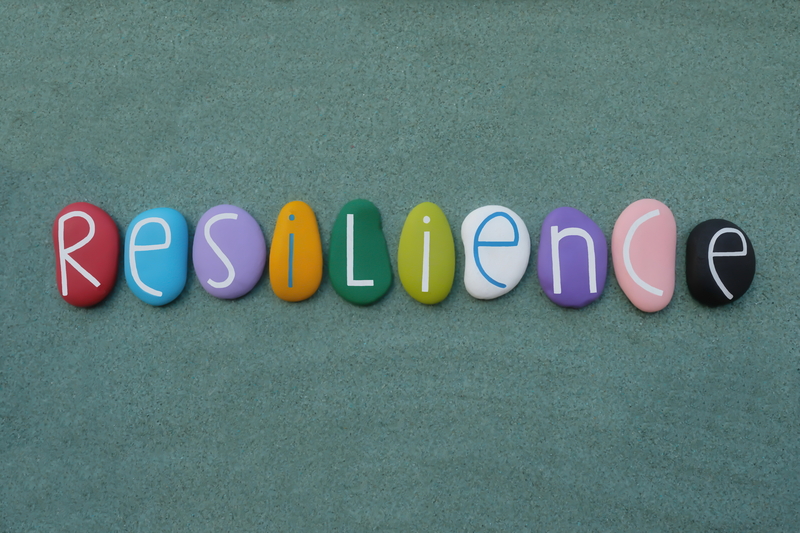
Resiliency is not a concept lost on us as we emerge from a global pandemic, but it can feel overwhelming to nurture resiliency in ourselves much less to teach it to our children. Jane Gillham defines resilience as “an innate capacity to rebound from adversity and change through a process of positive adaptation.” With a year of collective adversity behind us, there is an opportunity to lean into resiliency for our own mental health and wellbeing as well as to model this behavior for our children.
The Maryland Department of Behavioral Health has coined the term “mind resilience” and identified six core concepts including:
- Sense of competency
- Caring and respect for self and others
- Problem solving and coping skills
- Optimism and hope for the future
- Ability to reframe stress
- Sense of purpose and meaning
Broken down like this, these skills seem more manageable and it’s likely that you are already instructing, correcting, and encouraging your children in some of these ways. Let’s explore what this could look like for school-aged kids.
1. Don’t Help Too Soon
A big part of building competency and problem solving skills is persevering in a challenge and finding that you can do it. As parents, it can be easy to swoop in and help because we don’t like to see our children struggle or even because it is just faster and easier. What are skills that your kids could probably develop by themselves if you gave them the time and encouragement to try again? When something is done sloppily or incorrectly, take the time to bring your child back and gently re-instruct and encourage them that they are capable instead of rolling your eyes and doing it yourself.
2. Model Hope and Perspective
Discouragement and cynicism seem to come more easily for most of us than optimism and hope. Give your children eyes to see the bigger picture to help nurture optimism and their ability to reframe stress. Instead of minimizing their struggle by comparing it to yours or someone else’s, help them remember a time when they overcame a struggle of their own. Remind them of the pain they felt beforehand and the triumph they felt when they completed it. This can reassure them of their ability to persevere as well as give perspective of why it’s worthwhile to keep trying when they’re stressed or when they’ve failed. Encourage them that nothing lasts forever, not as a platitude but rather as a way to remember that most struggles in life are temporary.
3. Teach Kind and Respectful Self-Talk
Most parents feel pretty confident at teaching their children to respect others, often by modeling and requiring good manners, appropriate tone of voice, and apologizing when necessary. But what does it look like to teach self-respect and self-care? Everyone has an internal dialogue and it’s important to know what tone that voice often takes. What parents and key adults in the lives of kids say and how they say it can be easily internalized, leading to feelings of self loathing or a lack of confidence. Consider encouraging your child to speak to and about themselves the way you expect and correct the way they talk to others. If they are quick to name call themselves “stupid” or “ugly,” ask them how they would respond to their best friend if they were feeling that way and model how they could speak about themselves that way. If they often point out their flaws, explore why they focus on these instead of their strengths. Compassionate self-talk is an important coping skill and can also help to hone the way they care for others too.
4. Be a Student of their Strengths
Parents often know their children better than anyone else and have a large influence on how their children see themselves. Part of building meaning and purpose requires your child knowing who they are and what skills and talents and character traits they have to offer the world. Strive to look for their unique strengths and look for opportunities to point them out and cheer them on. Allow them to connect how those strengths could benefit them in the future. For example, if your child is particularly empathetic you could say something like “it is really amazing how much you care for people and how you can empathize with them. I could see you making a great counselor or teacher one day.” Children can tell the difference between a blanket compliment (like “you’re so smart”) and a unique strength you point out in them (like “the way you’re able to do math in your head so quickly is really impressive.”) Help them to see that the way they are uniquely wired is wonderful and full of purpose.
The reality for all of us is that there will be challenges in our lives that require us to keep trying and flex our “resiliency muscles.” It is likely that there will be hard things specifically in this season as we emerge from our COVID bubbles and have to reengage with people and at a faster pace. As a parent you have the ability to reframe those challenges as opportunities to try again and to do so in a kind and compassionate way. Be brave in allowing your children to struggle at times but also loving in the way that you encourage and cheer them on as they seek to build their own problem solving skills and willingness to try new things and to try again.

